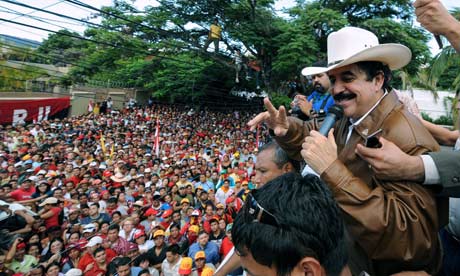
It was the type of journey Latino illegal immigrants know all too well: a clandestine border crossing, remote mountain roads, hiding in a car boot, dodging police checkpoints.
But Manuel Zelaya was no impoverished job-seeker smuggling himself into the United States. He was president of Honduras and he was returning home to reclaim power.
The leftist leader apparently traversed valleys and rivers and used a variety of vehicles, including a tractor, to wrongfoot coup leaders who banished him into exile three months ago.
Honduran security forces had orders to arrest Zelaya if he crossed the border. But somehow the tall, moustachioed president evaded checkpoints and on Monday made it to the Brazilian embassy in the capital, Tegucigalpa.
Today troops surrounded the compound and used batons and tear gas to disperse thousands of Zelaya supporters gathered outside. They made no move to storm the embassy.
The deposed president has not regained power but he has outfoxed his foes and seized the initiative – and the spotlight – in the week the UN general assembly is meeting in New York. The homecoming opened a new, volatile phase in a crisis that has divided Hondurans and confronted central America with its gravest diplomatic dispute since the cold war.
Venezuela's president, Hugo Chávez, celebrated his ally's daring. "It was a well-planned operation and it worked. Zelaya deceived the coup mongers and went in the trunk of a car and even in a tractor. The coup mongers should surrender power peacefully."
The US and Latin American leaders appealed for calm and urged both sides to talk. President Luiz Inácio Lula da Silva of Brazil said his embassy would continue give Zelaya refuge. "Brazil is guaranteeing that he stays there – that is an international right and we do not expect the coup leaders to touch the Brazilian embassy. We expect them to negotiate," he said.
Details of Zelaya's journey remain sketchy, but reportedly on Sunday a Venezuelan government jet took him from exile in Nicaragua's capital, Managua, touched down briefly in El Salvador and then took off for an unknown destination.
From his new headquarters, buzzing with aides, diplomats and journalists, Zelaya said he had evaded numerous obstacles to reach Tegucigalpa. "I had to avoid military checkpoints crossing very close to the mountains and sometimes through the valleys."
Even after he telephoned a TV station to announce his arrival on Monday, the interim authorities refused to believe it, dismissing the report as propaganda and insisting Zelaya was still in Managua. When the rancher turned president appeared on the embassy balcony with his trademark cowboy hat, the authorities moved swiftly. They declared a curfew, shut borders and airports and mobilised riot police to block Zelaya supporters.
A government adviser, Mario Fortin, told the Associated Press that international law did not rule out a raid on the embassy. "The inviolability of a diplomatic mission does not imply the protection of delinquents or fugitives from justice," he said.
In a letter to the Washington Post, the interim president, Roberto Micheletti, said he had no plans to surrender power. "Former president Manuel Zelaya has surreptitiously returned to Honduras, still claiming to be the country's legitimate leader, despite the fact that a constitutional succession took place on June 28."
Zelaya had alarmed traditional elites, the middle class and conservative institutions by veering left and embracing Chavez, a radical departure which was popular with many in the slums.
The international community agreed with Zelaya that his ousting at gunpoint by soldiers who bundled him onto a plane was in fact a coup. The joint operation by the army, congress and the supreme court sparked furious protests by Zelaya's mostly poor supporters.
Crisis talks in Costa Rica broke down last month without either side reaching an agreement. The strategy of the interim government was to ride out the diplomatic storm until elections in November installed a new leader.
0 comments:
Post a Comment